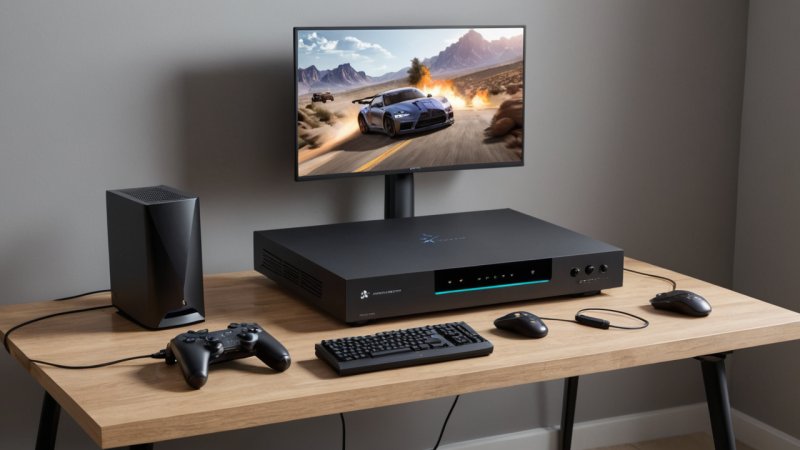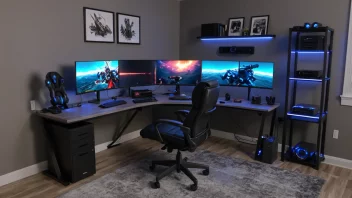In the world of online gaming, a seamless and reliable internet connection can make the difference between victory and defeat. For gamers, a well-optimized home network isn't just a luxury; it's a necessity. With the increasing complexity of games requiring real-time data transmission and the rise of cloud gaming, understanding how to enhance your home network is more important than ever. This article delves into practical steps you can take to improve your gaming experience at home, from upgrading hardware to optimizing settings. Whether you are a casual player or a competitive gamer, these insights will help you achieve a smoother and more enjoyable gaming experience.
Understanding Your Current Setup
Before making any changes, it’s essential to understand your current network setup. This involves knowing your internet speed, the type of connection you have, and how many devices are connected to your network.
Check Your Internet Speed
Start by testing your internet speed using a reliable speed test service like Ookla's Speedtest or Fast.com. Look for the following:
- Download Speed: This is crucial for how quickly you can receive data from the internet.
- Upload Speed: Important for sending data, especially when streaming or participating in online multiplayer games.
- Ping/Latency: Measured in milliseconds, this indicates how quickly your connection responds to requests. Lower numbers are better.
Evaluate Your Connection Type
There are primarily two types of connections: wired (Ethernet) and wireless (Wi-Fi). Wired connections typically provide faster speeds and lower latency, making them ideal for gaming. If you are currently using Wi-Fi, consider the distance between your router and gaming device, as well as any obstacles in between.
Upgrading Your Hardware
Once you have a clear understanding of your current setup, consider upgrading your hardware to enhance your gaming experience.
Invest in a Quality Router
Your router is the heart of your home network. Look for routers designed specifically for gaming, which often have features like Quality of Service (QoS) settings to prioritize gaming traffic.
- Dual-Band or Tri-Band Routers: These routers can handle multiple devices better and reduce congestion.
- MU-MIMO Technology: This allows the router to communicate with multiple devices simultaneously, improving performance in busy households.
- High-Speed Standards: Ensure your router supports at least Wi-Fi 5 (802.11ac) or Wi-Fi 6 (802.11ax) for optimal performance.
Consider Wired Connections
If possible, connect your gaming device directly to the router using an Ethernet cable. This will provide the most stable and fastest connection. If your gaming setup is far from your router, consider using powerline adapters or Ethernet over coaxial adapters.
Optimizing Your Network Settings
In addition to hardware upgrades, optimizing your network settings can significantly improve your gaming experience.
Adjust Quality of Service (QoS) Settings
QoS settings allow you to prioritize gaming traffic over other types of internet usage. This means that during peak usage times, your gaming packets will take precedence, resulting in lower latency and a smoother gaming experience.
Change Your DNS Settings
Sometimes, your Internet Service Provider's (ISP) DNS can be slow. Consider switching to a faster public DNS, such as Google DNS (8.8.8.8 and 8.8.4.4) or Cloudflare DNS (1.1.1.1). Changing DNS settings can often improve loading times for games and reduce latency.
Channel Selection
If you are using Wi-Fi, selecting a less congested channel can improve your connection quality. Most routers have auto-select features, but you can manually choose a channel using Wi-Fi analyzer tools to find which channels are less crowded.
Maintaining a Healthy Network
Once you've optimized your network, maintaining its performance is key to ensuring consistent gaming quality.
Regularly Update Firmware
Keep your router's firmware up to date. Manufacturers often release updates that improve performance and security, which can positively impact your gaming experience.
Limit Background Applications
When gaming, close any unnecessary applications that might be using bandwidth in the background. This includes file downloads, streaming services, and updates. Also, consider scheduling large downloads during off-peak hours to avoid congestion during gaming sessions.
Advanced Options for Serious Gamers
For those who take gaming seriously, advanced options can further enhance your home network.
Mesh Wi-Fi Systems
If you have a large home or experience dead zones, consider investing in a mesh Wi-Fi system. These systems consist of multiple nodes that work together to provide consistent coverage throughout your home.
Network Monitoring Tools
Using network monitoring tools can help you identify bandwidth hogs and troubleshoot issues. Software like NetSpot or GlassWire can give you insights into your network's performance and help you make informed adjustments.
Conclusion
Enhancing your home network for gaming is a combination of understanding your current setup, upgrading your hardware, optimizing settings, and maintaining your network health. By investing time and effort into these areas, you can significantly improve your gaming experience, reduce latency, and enjoy a smoother connection. Whether you are looking to crush your competition or simply enjoy your favorite games with friends, a robust home network is the foundation for gaming success.






